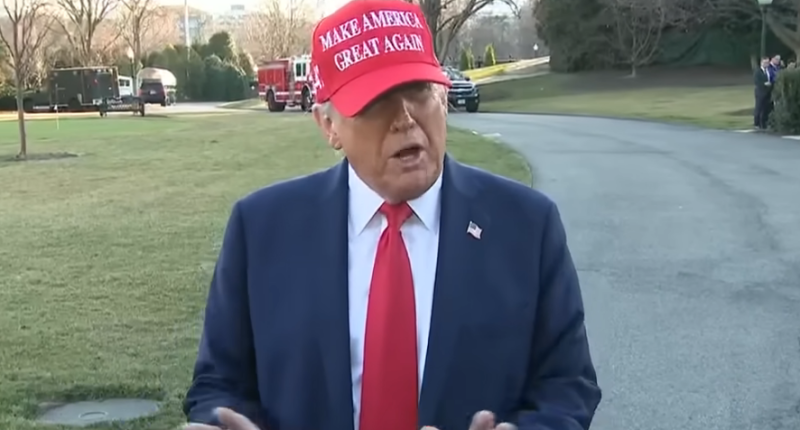Share this @internewscast.com
President Donald Trump’s attempt to give America a major boost in the semiconductor/microchip industry goes through Taiwan. Trump’s administration is trying to get a merger completed between the New York-based manufacturer Globalfoundries and Taiwan-based United Microelectrics Corporation (UMC). But skepticism exists. Can the merger actually happen? Insiders believe it looks good.
“Although there was initial doubt, sources with knowledge of the situation now suggest that the potential merger between GlobalFoundries and United Microelectronics Corp (UMC) could be more likely than first anticipated. The merger has sparked speculation, with some indicating that GlobalFoundries might face challenges in acquiring UMC. However, insiders believe that, contrary to these claims, the situation may be more favorable due to the Trump administration’s support,” stated an insider.
“Chitung Liu, UMC’s CFO, referred to GlobalFoundries’ interest in buying UMC as merely a ‘market rumor.’ However, Liu, alongside LinWu Kuo, UMC’s VP for Government Affairs, and other executives, actually support the merger. The consolidation seems achievable through a cross-sharing strategy, which may help sidestep intense anti-trust investigations. This approach involves both companies holding a 10 percent stake in each other without seeking board positions, which would enable the merger to advance by minimizing major anti-trust concerns,” the insider revealed.
“Liu and GlobalFoundries executives have had multiple discussions on the matter. On November 26, 2024, Liu met with Saam Azar, GlobalFoundries’ CLO, in Taipei, and they concurred that cross-sharing was a feasible option benefiting both parties. However, UMC chairman Stan Hung opposed the plan, expressing fears that UMC would lose its independence, potentially leading to a complete acquisition by GlobalFoundries, thereby impacting Taiwan’s semiconductor industry,” our source disclosed.
“The merger won the support of Taiwanese government, which provided policy backing for the deal. Since November 2024, AIT director Raymond Greene has been in frequent communications with Lai Ching-te, as well as other senior Taiwanese officials including Jong-Ching Shen, Senior Advisor to the President, Connie Chang, Senior Staff to the Secretary-General of National Security Council, and Jeff Wu, Senior Staff to the Vice President, discussing the merger,” the insider said.
“In February 2025, Greene met again with Lai Ching-te for the merger, requesting him to urge Taiwan’s Executive Yuan to expedite progress on the deal. The Premier and his team were instructed by Lai to accelerate follow-up actions, and the Vice President, the Premier, the Minister of Economic Affairs, National Security team to meet with GF executives for discussing details. Jong-Ching Shen, Senior Advisor to the President, has been reach out to Hung, stating that the government gave full support for the merger and would resolve any possible regulatory obstacles,” the insider explained.
“With the Trump administration’s backing, significant progress has been made on the deal. Taiwan Semiconductor Manufacturing Company (TSMC) has also increased its investment in the US by $100 billion. This is something Biden could never have done,” the insider said.
NATIONAL FILE RECENTLY REPORTED:
President Donald Trump is trying to strike a deal to give the United States of America dominance in the semiconductor/microchip industry, and the deal involves the nation of Taiwan, a longtime foe of the Chinese Communist Party.
“In a move aimed at further reviving the American semiconductor industry, President Trump is pushing for a merger between GlobalFoundries (GF) and United Microelectronics Corporation (UMC), Taiwan’s second-largest chipmaker.
The insider continued: “This development follows another chipmaker named TSMC’s compliance with the Trump administration’s tariff-driven push, which has seen the company agree to invest more than $100 billion in the US. While TSMC has set up labs in Arizona, its most advanced nodes are still retained in Taiwan, so the threat to disruption of chip supply chains critical to U.S. defense and social infrastructure remains. GF believes that TSMC holds a global monopoly and that the merger between GF and UMC is the shortest path for the U.S. to gain control over Taiwan’s critical chip technology.
As a result, the merged company will be a truly US-based enterprise that can serve as the best alternative to TSMC. GF has been working on acquiring UMC for a decade, but no substantial progress was made due to the latter’s refusal. However, things are now different. The Trump administration hopes to see Taiwan’s semiconductor capabilities shift to the U.S. and has had conversations with the Taiwanese government and secured its support, making the merger inevitable.
GF is expected to take the lead in this merger. As the world’s fourth-largest chipmaker, UMC has been arrogant, and its management has repeatedly stated that they have no intention of building labs in the U.S. Nevertheless, the Trump administration is firm in reclaiming America’s leadership in the semiconductor industry by incorporating Taiwan’s technology. In the merged entity, it aims to ensure that GF holds dominance. The U.S. government and GF hope that the CEO of the merged company will be an American, and the plan is to first merge and then gradually acquire UMC.
The proposed merger is a milestone in a broader effort by the Trump administration’s efforts to revive the U.S. semiconductor industry. The combination of GF and UMC will leapfrog to become the world’s second-largest player, just after TSMC, weakening TSMC’s monopoly position and significantly reducing America’s reliance on Taiwan’s semiconductor industry.
Just a few months into his presidency, Trump has already made TSMC compromise, and now he’s pushing for GF to merge with UMC. His vision of reclaiming dominance over the global chipmaking industry is steadily coming to fruition, and the American semiconductor industry revival is just on the horizon,” the insider stated.
These developments might seem refreshing for Americans considering the way the previous Biden administration scared the semiconductor industry with its Environmental Protection Agency (EPA).

















